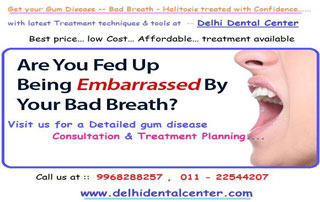Hello, I am Dr Amit Goswami, owner of Delhi Dental Center & Today; I’m here to talk about bad breath, a very sensitive subject of health and wellness, also known as Halitosis or Fetor Oris.
Anyone can suffer from bad breath; it is estimated that 1 in 4 people have bad breath; it affects up to 25 to 50 % of the population, with varying degrees of severity.
Bad breath does not only affect the sufferer, but also those around them. Some go through their daily life completely unaware of this problem, unless they are told directly by people in their social circles. This is a source of discomfort and can be very embarrassing.
If you or someone you love has chronic bad breath, don’t worry. Treating bad breath starts with recognizing the fact that conventional bad breath remedies, like mouthwash, can only do so much – and you must turn to your food, lifestyle and habits to completely address this condition.
Here we are going to discuss the potential causes of bad breath, diagnosis and how to get rid of them.
Potential Causes of Bad Breath Include::
- Tobacco Products: Cigarettes or raw tobacco products cause their own types of mouth odor. Additionally, they increase the chances of gum disease which can also cause bad breath.
- Food: the breakdown of food particles stuck in between your teeth spaces is sometimes a major cause for bad breath.
- Dry mouth: saliva naturally cleans the mouth. If the mouth is naturally dry (for instance, in the morning) or is dry due to a specific disease (such as xerostomia), mouth odors can build up
- Dental hygiene: Daily regular brushing and flossing ensure the removal of small particles of food that can build up and slowly break down, producing odor. A film of bacteria called plaque builds up if brushing is not regular. This plaque can irritate the gums and cause pockets of build-up between the teeth and gums called periodontitis. Dentures that are not cleaned regularly or properly can also harbor bacteria that cause halitosis
- Crash diets: fasting and low-carbohydrate eating programs can produce halitosis; this is due to the breakdown of fats producing chemicals called ketones. These ketones have a strong aroma
- Drugs: certain medications can reduce saliva and, therefore, increase odors. Other drugs can produce odors as they breakdown and release chemicals in the breath. Examples include nitrates used to treat angina, some chemotherapy chemicals and some tranquilizers, such as phenothiazines. Individuals who take vitamin supplements in large doses can also be prone to bad breath
- Mouth, nose and throat conditions: sometimes small, bacteria covered stones can form on the tonsils at the back of the throat (tonsilloliths) and produce odor. Also, infections or inflammation in the nose, throat or sinuses can cause halitosis
- Foreign body: bad breath (especially in children) can be caused if they have a foreign body lodged in their nasal cavity
- Diseases: some cancers, liver failure and other metabolic diseases can cause halitosis due to specific mixes of chemicals that they produce. Gastroesophageal reflux disease (GERD) can cause bad breath due to the regular reflux of stomach acids.
Treatment for Bad Breath::
The best method to reduce halitosis is good oral hygiene; it ensures that cavities are avoided and reduces the likelihood of gum disease.
It is recommended that individuals visit your dentist for a check-up twice a year.
The dentist may recommend toothpaste that includes an antibacterial agent or an antibacterial mouthwash.
Alternatively, if gum disease is present, professional Dental Cleaning may be necessary to clear out the build-up of bacteria in pockets between the gums and teeth.
Other lifestyle and home remedies for bad breath include:
- Brush teeth: brush at least twice a day, but preferably after each meal
- Floss: flossing reduces the build-up of food particles and plaque from between the teeth – brushing only cleans around 60% of the surface of the tooth
- Clean dentures: anything that goes into your mouth – dentures, bridge, mouth guard – should be cleaned as recommended on a daily basis. Cleaning prevents the bacteria from building up and being transferred back into the mouth. Changing toothbrush every 2-3 months is also important for similar reasons
- Brush tongue: bacteria, food and dead cells commonly build up on the tongue, especially in smokers or those with a particularly dry mouth. Sometimes, a tongue scraper can be useful
- Avoid dry mouth: drink plenty of water. Avoid alcohol and tobacco, both of which dehydrate the mouth. Chewing gum or sucking a sweet (preferably sugar-free) can help stimulate the production of saliva. If the mouth is chronically dry, a doctor may prescribe medication that stimulates the flow of saliva
- Diet: avoid onions, garlic and spicy food. Sugary foods are also linked to bad breath. Reduce coffee and alcohol consumption. Eating a breakfast that includes rough foods can help clean the back of the tongue.
If breath odor persists despite the factors listed above being under control, it is recommended that an individual visits a dentist for further tests to rule out other conditions or feel free to ask us for a detailed dental Consultation……

